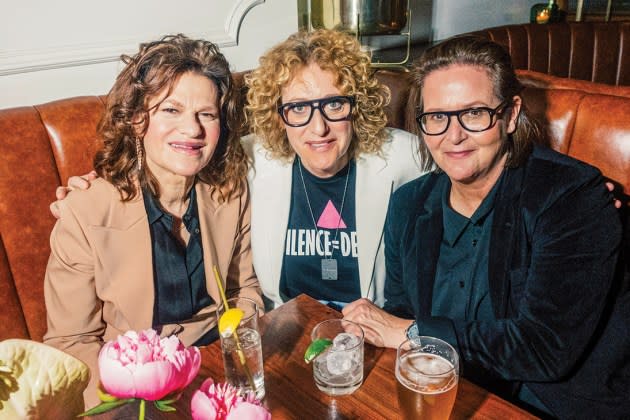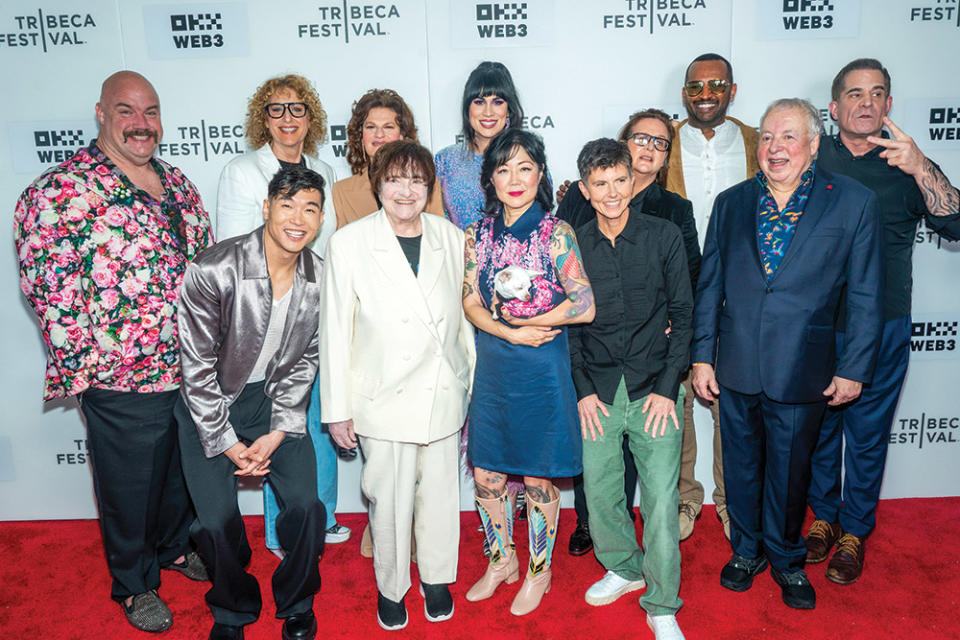Who’s Laughing Now? A New Doc Delves Into the History of Queer Comedians

In the making since 2019, Page Hurwitz’s new Netflix documentary, Outstanding: A Comedy Revolution, taps a throng of queer notables — from Wanda Sykes, Rosie O’Donnell and Lily Tomlin to Joel Kim Booster, Fortune Feimster and Bob the Drag Queen — to show how LGBTQ funny people have left their mark and challenged others’ perceptions for more than a century.
“None of these comedians set out to change the world. They set out to make people laugh,” Hurwitz said at the film’s Tribeca Festival premiere ahead of its June 18 streaming debut. “And along the way, they did change the culture and, I think, they changed the world.”
More from The Hollywood Reporter
Netflix Taps Hannah Minghella to Head Feature Animation and Live-Action Family Film
Deepening Empathy and Understanding of the Black American Diaspora Through Food (Guest Column)
Featuring an intergenerational and diverse cast, the documentary — set against the backdrop of the Netflix Is a Joke Fest’s Stand Out: An LGBTQ+ Celebration show in 2022 — unpacks what has fueled the cycle of progress and regression that has surrounded the queer comedy community for decades.
The doc ranges far and wide, from entertainers on the vaudeville circuit and early pioneers such as comedian and actress Moms Mabley and female impersonator Rae Bourbon to the role of variety shows and LGBTQ cruises; from the Stonewall Riots and HIV and AIDS to the feminist movement and politics of the Reagan and Clinton administrations.
Throughout, Hurwitz underscores the impact key moments and movements had on how the queer comedy community developed.
“When you explore the history of queer stand-up, especially in the modern era, it’s very much a female driven story and there are a couple reasons for that. Our history is this intergenerational torch pass and we all influence each other, but comedian after comedian I interviewed said women really led the way,” the director explains. “AIDS was also devastating.[The Kids in the Hall‘s] Scott Thompson talks about it in the film, but it wasn’t even possible to start because there was so much homophobia. Then we lost a generation of men who could have been terrific comedians, and in some cases were, but we didn’t get to see their entire careers.”
Among those singled out for their bravery and impact is comedian and activist Robin Tyler. A feminist and out lesbian since her teens in the ’50s, she was the first comic to come out on national television back in 1978. After speaking onstage during a TV special about her identity and taking a swipe at infamous anti-LGBTQ crusader Anita Bryant, Tyler lost work, with ABC canceling a variety show with her and partner Pat Harrison.
Yet Tyler, like many of her fellow comedians, found joy in liberation even then, offering a blueprint for everyone who followed. “I don’t care about [having lost] two years on television, pretending you’re straight,” she tells THR on the red carpet of the doc’s world premiere. “We gained everything. If you gain your freedom — if you’re free — nothing’s more important.”
While the film also calls out a deluge of anti-gay material spouted over the years by the likes of Sam Kinison, Eddie Murphy, Mel Brooks, and Andrew Dice Clay, the focus stays mostly on themes of perseverance and celebration, especially as seen at the triumphant Netflix Is a Joke group show. It’s a gathering comedian Todd Glass tells THR he would have turned down only a decade ago. “I wouldn’t [have] even wanted to have been associated with a gay-related show. I would have said, ‘No, I don’t want to brand myself. I do stand-up. I happen to be gay,’ ” Glass says at Jungle Bird’s, where the doc’s stars gathered following the premiere to celebrate Hurwitz’s historic endeavor. “But 10 years later, obviously, I feel completely different — and I’m glad that I do.”
That journey of fully bringing oneself to the stage for each of the doc’s featured comedians — the sprawling cast also includes Margaret Cho, Billy Eichner, Trixie Mattel, Judy Gold, Eddie Izzard, Hannah Gadsby and Mae Martin — is a slightly different story. For Solomon Georgio, among the latest generation of queer comedians, the only choice was to be out. “I wanted [comedy] first before I knew anything else about myself, so why am I going to limit anything I do when I have this one goal that I’m passionate about?” he explains. For Sandra Bernhard, it may have been part of an unconscious effort to try something different as an entertainer, and a byproduct of the times. “I was a feminist. I grew up in an era where I thought, ‘Well, anything goes, so I’m going to be exactly who I am,’ and why wouldn’t I do that in my work?”

Yet a fear of association — and the very real threats that sexuality or nonconforming gender expression can present to personal and professional life — remains a palpable theme. “There’s the fear that an adjective will eclipse your identity,” says Guy Branum at the doc’s after party.
As the doc notably highlights, threats to LGBTQ comedians have not subsided, with trans performers facing vitriolic attacks similar to those experienced by gay acts in the ’80s. “I’ve had a lot of moments where I’m scared to go out there. I’ve had a lot of moments where I’m on a lineup and I see so many people making fun of trans women in their act, and I see an audience of people laughing at it,” says comedian Roz Hernandez. “I don’t want to entertain this audience, but I go out there anyway because I’m not going anywhere.”
Even in the face of the latest round of cultural and industry backlash, Hernandez and her counterparts like Patti Harrison, River Butcher, Georgio and Booster are rejecting fear and coming as their full selves — onstage and off. “I’m really not concerned with getting labeled as an XYZ comedian,” Booster says. “Stand-up is a great meritocracy. People aren’t laughing at me because of labels. They’re just not.”
What audiences are laughing at is queer comedians’ unique perspective and their “understanding that your own perspective is not the default,” Branum says. It’s what makes queer comedians who they are, and they’re offering it up onstage now more than ever. “What’s expanding is now people are really identity-forward. We have a lot of comedians who are publicly talking about being nonbinary, being gender-nonconforming,” says Cho. “It’s a new era of comedy, and that’s really exciting.”
It’s an era that has opened the door to specials like Hannah Gadsby’s Gender Agenda and director Quentin Lee’s Laugh Proud — all evidence of the inevitability of out LGBTQ stand-ups and queer comedy. “We will keep going,” Hurwitz tells THR. “It hasn’t been easy. These comedians lost a lot. Still, here we are, and we’re not going anywhere.”
A version of this story first appeared in the June 19 issue of The Hollywood Reporter magazine. Click here to subscribe.
Best of The Hollywood Reporter

 Yahoo News
Yahoo News 
